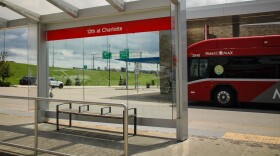-
The Kansas City Area Transportation Authority will start charging people to ride the bus again in June. It promised free fares would continue for some people, but it hasn’t released a plan for them. Nonprofit providers and riders are concerned that people will fall through the cracks in the meantime.
-
The Kansas City Area Transportation Authority will charge for bus rides starting in June. The $2 fare can be paid through an app, credit or debit card, or reloadable fare cards.
-
Around 80% of bus stops across the metro do not have somewhere for riders to sit. Even fewer have a shelter. An interactive map from KCUR shows where to find amenities at each bus stop in the metro, and what the area transit agencies are doing to add more.
-
Johnson County commissioners unanimously approved the county's first ever strategic plan for bus, micro transit and paratransit services. It recommends focusing on increasing frequency of buses along a few key routes, reinstating bus fares and rebranding as "Ride JoCo."
-
About 75% of Kansas City bus stops don't have anywhere to sit while you wait, and the Kansas City Area Transportation Authority keeps removing benches despite complaints from riders. Sunrise Movement KC is taking things into their own hands, but their makeshift seats may be removed as quickly as they're assembled.
-
RideKC is discontinuing the popular Main Max bus line to avoid duplicating service with the KC Streetcar’s Main Street extension. A new route will take riders further south to 75th Street, while other bus lines undergo changes to connect riders to streetcar stops.
-
Kansas City and the Kansas City Area Transportation Authority finalized a contract today, after months of fraught negotiations. The city’s bus service will continue without any cuts, but fares will be reinstated.
-
Kansas City and the Kansas City Area Transportation Authority haven’t been able to agree on a contract since May. Unless they agree on one soon, the city’s bus service could be at risk.
-
The Kansas City transit agency has installed narrow "leaning benches" at busy bus stops downtown and touted them as an accessible amenity. But riders and experts disagree and say they’re made to make people uncomfortable.
-
A patchwork of counties and cities huddled around the confluence of the Kansas and Missouri rivers makes it harder to develop affordable, efficient public transit in the Kansas City region. Transit funding decisions get handled within each jurisdiction, with little or no coordination between them, and the KCATA has no power to levy taxes.
-
Johnson County's transit service sees about 379,000 riders a year on fixed routes, compared to 32,800 microtransit riders and 84,100 paratransit riders. County commissioners are considering adjusting fares and services to attract more riders.
-
Toll boxes may soon be revamped on all RideKC buses if the Kansas City Area Transportation Authority reinstates fares to address a multi-million-dollar budget shortage. That would especially hurt the low-income residents who rely on free buses most, and could lead to a drop in ridership.
Play Live Radio
Next Up:
0:00
0:00
Available On Air Stations











